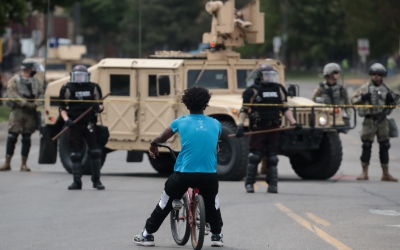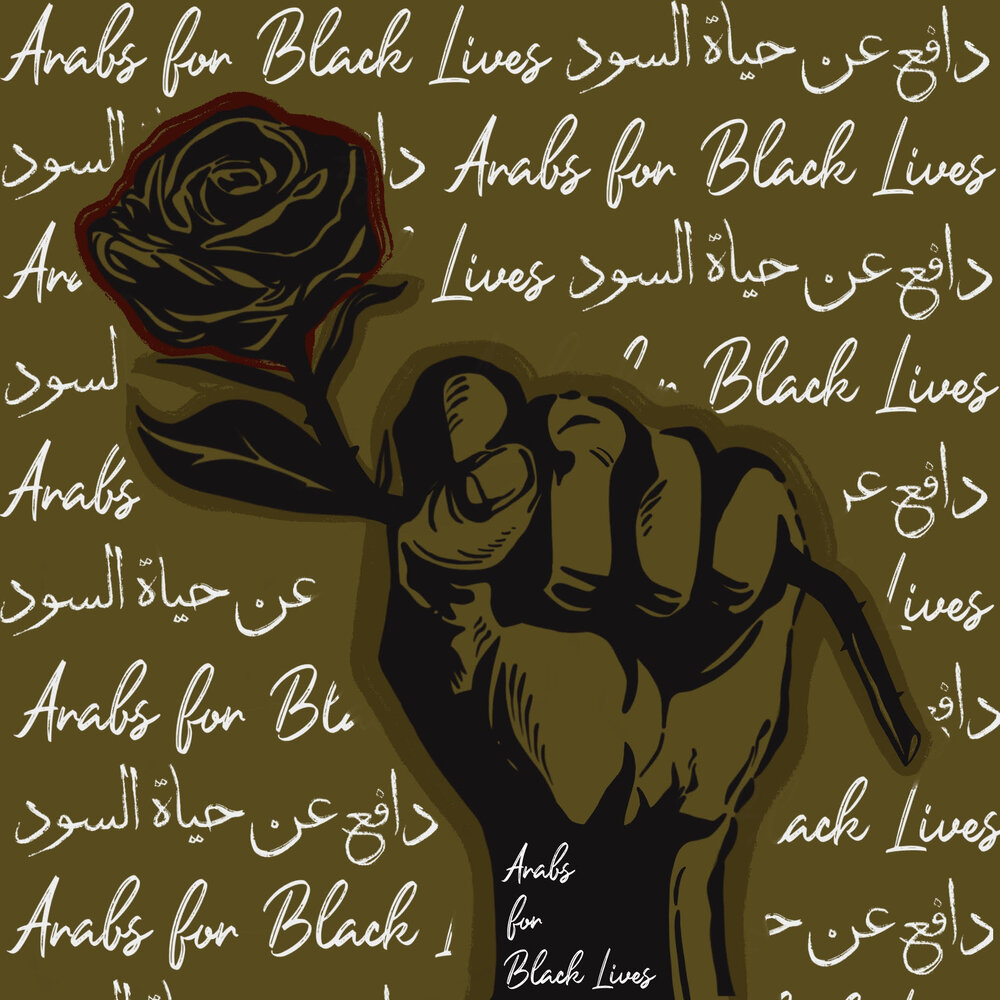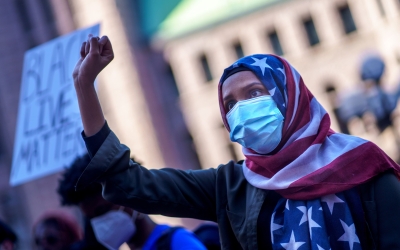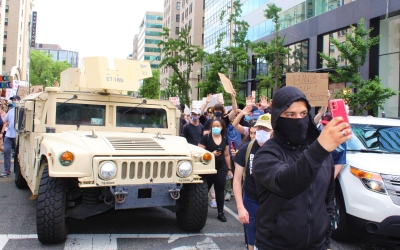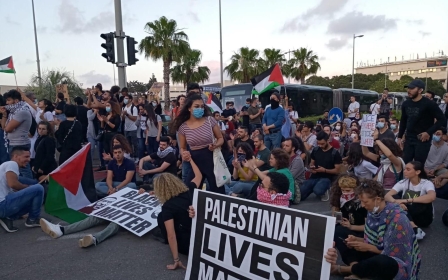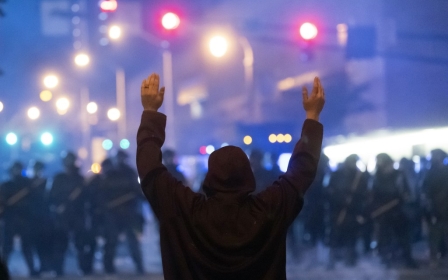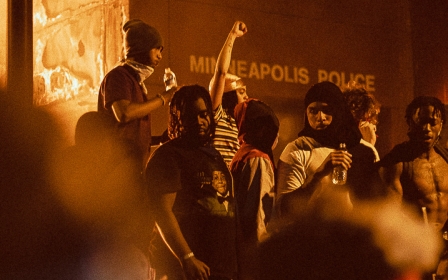Arabs for Black Lives urges community to do its part against racism

Arab Americans have launched an anti-racism initiative in solidarity with the African-American community as protests continue over the death of George Floyd, an unarmed Black man who died at the hands of Minneapolis police last week.
Congresswoman Rashida Tlaib, Golden Globe-winning actor Ramy Youssef and Palestinian-American historian Rashid Khalidi were among more than 1,600 people who endorsed a statement this week from the Arabs for Black Lives Collective calling on fellow Arabs to combat bigotry within the community.
The statement, which is accompanied by a call for action, urges Arab communities to commit to "disrupting racist behaviour and language," to support demands made by the Black Lives Matter movement and to donate to bail funds for protesters and African-American groups.
"We must collectively work to eradicate anti-Blackness and racism from anywhere it persists within the community," the petition by the group reads.
"We must have the vital conversations within our own families and with our loved ones about things we can do to ensure we actively do anti-racism work."
Rasha Mubarak, a member of the Arabs for Black Lives Collective committee, said the aim of the group is to build on previous anti-racism work and outline duties of Arabs in combating anti-Blackness "institutionally, structurally and interpersonally" down to their own households.
"We want to embed calls to action, asking our community not to just lean into the conversation, but to talk about accountability and responsibility and the role that we play in society," Mubarak told Middle East Eye. "We have the responsibility to dismantle anti-Blackness."
'Protect Black lives'
The statement featured an illustration by Toronto-based artist Jasmine Hawamdeh depicting a raised fist holding a rose against an olive-green background with "Arabs for Black Lives" in English and "protect Black lives" in Arabic scripted all round it.
"Artists now have the ability to express solidarity in addition to humanising statistics and bringing light to issues through art," Hawamdeh told MEE. "Nothing is more powerful than artwork that can really move and change perspectives."
The 21-year-old New York-born artist, who is of Palestinian heritage, added that the Arab community must stand in solidarity with African Americans against bigotry, and that starts with pushing against the racism within.
"We have to understand that we are strong united in order to dismantle white supremacy," Hawamdeh said.
"I think it's important for us to look within our own backyard and think about the anti-Black racism that exists within our community in order for us to advance and truly strive to be allies."
'You don't have to be an activist... You don't need to have a platform or a stage or a camera in front of you to do what we are responsible to do as humans'
- Rasha Mubarak, Palestinian-American organiser
The video of Floyd's death, which showed a police officer pressing his knee into the victim's neck for several minutes, rocked the nation, prompting demands for justice and protests in all 50 states.
Floyd's death followed the killing of African-American medical worker Breonna Taylor, who was shot eight times by police officers during a raid on her home in Kentucky, and Ahmaud Arbery, who was fatally shot by a white vigilante while jogging in Georgia in February.
In many cities, the demonstrations have encountered a strong response from local governments, with mayors declaring curfews and police officers using tear gas, rubber bullets and live ammunition to disperse the crowds. Rioting and looting have also taken place amid the chaos.
In Washington, President Donald Trump has called for an iron-fist response to quell the unrest, deploying heavily armed federal law enforcement officers to face off against peaceful protesters.
Despite the tensions, protesters have succeeded in highlighting the actions of law enforcement officers, which has opened a debate about the need for police reform.
Doing business in Black communities
Within Arab and Muslim communities, a conversation has also begun about doing business in predominantly Black neighbourhoods.
Minneapolis police killed Floyd after an employee at Cup Foods, an Arab-owned store, called the authorities on suspicion that the African-American customer was trying to pass off a counterfeit $20 note.
US government guidelines urge businesses to contact law enforcement when they suspect that they have been handed fake money.
In the case of Cup Foods, the store appeared to have good relations with the Black community.
The owner, who was not present when the police were called, has come out in full support for the Black Lives Matter movement, calling for justice for Floyd.
Still, activists are now warning Arab store owners against swiftly calling police on Black customers, given the potentially fatal consequences for African Americans.
"We have a critical moment before us, and our families, to ensure we are not reliant on a system that makes someone else vulnerable to tragedy," the statement by the Arabs for Black Lives Collective said.
"In many major cities across the US, Arab-owned corner stores are concentrated in predominantly Black working class neighbourhoods.
"We need to examine how we are showing up to support the Black community, and what steps we are taking that do not involve reliance on law enforcement. We have seen too many lives violently taken away by bringing police into Black communities."
You don't have to be an activist
Mubarak told MEE that activists are looking to establish curriculums to spread awareness about the dangers of calling the police on Black customers and to explore alternative ways for dealing with issues in the stores.
She said people should fight racism as part of their daily lives by having dialogues and taking whatever action they can to "uplift the voices of those impacted".
"You don't have to be an activist. You don't need to be in Congress. You don't need to have a platform or a stage or a camera in front of you to do what we are responsible to do as humans," she said.
Mubarak also stressed that the struggle of African Americans impacts "our liberation".
"We are never going to be free if a group of people continues to be marginalised," she said.
"That's why we are calling on folks to start off having conversations with family, within communities and using whatever role that they have to amplify this work."
Middle East Eye delivers independent and unrivalled coverage and analysis of the Middle East, North Africa and beyond. To learn more about republishing this content and the associated fees, please fill out this form. More about MEE can be found here.


